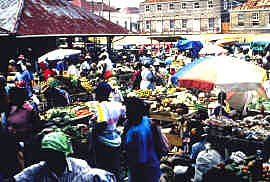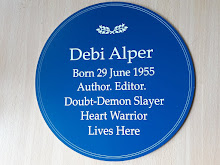The time has come - how I came to the decision to blog the Revo
The Revo Blog. Part 1 - background to Grenada
The Revo Blog. Part 2 - background to me
The Revo Blog. Part 3 - Feb-March 1982 (1 of 2)
The Revo Blog. Part 3a - why 'Revo'?
The Revo Blog. Part 4 - Feb-March 1982 (continued)
The Revo Blog. Part 5 - April 1982 - June 1983. London
The Revo Blog. Part 6 - June-Sept 1983
The Revo Blog. Part 7 - relationships
The Revo Blog. Part 7a - Faye's film
The Revo Blog. Part 8 - rumours
October 1983. The last days of the Revo
Saturday 15th October

The mood in town is tense and very angry. After my first trip to the hospital I go to the market square. Kenrick Radix, a member of the People's Revolutionary Government (PRG), is in the square, drumming up support for Maurice. A demo begins with placards saying, 'We want Maurice'.
You have to understand. This is a place where, for four and a half years, the people have been led to believe that they are in control of what happens in their country. Now things are happening that they're not even being told about. They've even been instructed not to talk about them! Taking to the streets to voice their concerns has always been an integral part of the Revo and was the logical next step to ensure their voices were being heard.
I meet another party member who's keen to give her version of what's going on. She tells me Maurice had been 'misbehaving' for some time; holding back development, misdirecting funds, hanging onto power for himself ... She even hints at a possible CIA connection but says the party's hands were tied because of the popular support Maurice has.
She's twitchy, as well she might be given how out of step her perceptions are with almost everyone else around us. The Central Committee are now in control of the country, she confides, and they're organising house-to-house visits to explain the situation. She tells me that the problems have been going on for a year but the Central Committee's hand has now been forced. The alternative is bloodshed. The Committee are currently meeting to decide on what action to take.
It sounds so plausible, but I don't buy it for one moment, and neither does anyone else I speak to. For the first time, I hear Hudson Austin's name mentioned. He's the chief of the People's Revolutionary Army (PRA) and L tells me he backs Coard. That means it's unclear where the army's loyalty lies. From her hospital window, H saw troops mobilising on the beach last night, though she couldn't see what they were up to.

Each time I come home from the hospital, I switch on the radio. Regional stations report confusion and sketchy details. Flights are still ok but phone communications have apparently been disrupted. On Radio Free Grenada (RFG) a spokesperson denies reports from elsewhere in the Caribbean that several members of the government have been arrested but he gives no further info.
In other words, we're being told what's not happening, but are given no clue as to what is.
So ... H is in hospital, B is both physically and mentally sick and L is making himself scarce. In the evening, I stay home, glued to the radio. The Prime Minister's office (just who the Prime Minister is at this point is a question not addressed) states,
'No questions will be answered to journalists in this period.'
What is it that they are hiding?
At 6.00 pm there's a new development. Leon Cornwall, a PRG and Central Committee member, who, with Hudson Austin, heads up the People's Revolutionary Army (PRA), delivers a statement. It's still a confusing mish-mash of rumour and counter rumour, but this time Maurice is finally mentioned. He's directly blamed for starting the original rumour and criticised for holding onto power for himself. The same rules apply to everyone, he says, and that is why action had to be taken against Maurice.
'The party will tolerate no one-manism. The army is united down to the last private,' he warns.
The tone of the broadcast is very heavy and repressive. As I sit scribbling down his words in my diary, a chill runs through my veins. Nothing like this has been heard before. It's clear we've entered a new stage.
The 7.00 pm news says that Kenrick Radix resigned two days ago and that a number of the organisers of today's demo 'and other people involved' have been detained. It's not clear if this includes Radix or not. So now people are not allowed to demonstrate in the tradition of the Revo and they're not allowed to conjecture about what's going on. The news makes no mention of the earlier statement by Leon Cornwall on behalf of the PRA and the omission leads to a feeling of unreality.
This can't be happening ...
Sunday 16th October
In between hospital visits I catch the midday news, which confirms that Radix is among those arrested. It's announced that an 'important statement' will be made this evening at 10.00 pm.
In the event, it's not 'til midnight, long after most Grenadians have gone to bed, that the statement by Hudson Austin on behalf of the PRA is broadcast. Austin confirms what I heard from the party member yesterday: that Maurice wanted power, that the problems had been hidden from the people for the sake of unity, that he is responsible for the current situation.
I sit alone in the dark and wonder if they really believe the people will swallow this line. All along people have been demanding to hear Maurice speak for himself and there's no sign of that being allowed to happen. They're not allowed to talk about what's going on in case they're arrested for spreading rumours and they're not allowed to demonstrate. They've gone from being in control to being controlled. And they're expected to just accept their new status? Surely, those who now are clearly the ones holding the reins of power must know that's not going to happen ...
Monday 17th October
Another demo was supposed to take place today but the rain is pouring down in sheets and people are keeping their heads down.
Tuesday 18th October
H is discharged from hospital and I bring her home. Though she's still weak and far from well, it will be a relief not to have to make the twice daily trips into town. She has to be on a very restricted diet - no fats at all while her liver recovers - and that's going to stretch my powers of invention.
C tells me she attended a NACDA political education meeting today. A spokesperson from the Ministry of National Mobilisation was grilled by the co-op workers. The questions they ask demonstrates their clear grasp of the issues:
'Who has more power - the party or the people?'
'Who has more power - the party or the security forces?'
'What's the reason why we're not allowed to see Maurice?'
'How is it decided whether a person is a comrade or not? We've noticed that RFG has started referring to Kenrick as "Mr" Radix, while others are still referred to as "comrade".'
The spokesman let slip that Jacky Creft, the Minister for Education and Maurice's partner, is 'up there with Maurice'.
In a frantic attempt to claw back lost ground he says that she's only there because Maurice asked for her. This response is met with jeers of disbelief.
'So she's under house arrest too,' observes an astute co-op member.
'No one's under house arrest,' the hapless spokesman protests. 'Maurice is confined to his home for security reasons.'
'What's the difference?'
'There's a difference in law. Radix, on the other hand, is detained ...'
Weasel words and no one's taken in.
On the 7.00 pm news we're told that Errol George, Maurice's security officer, has made a statement implicating Maurice. Three hundred people demonstrated in St Andrews earlier today, marching to Pearls airport, the newreader tells us.
Then - bizarre and surreal - there's a business-as-usual statement about the economy. As though all this is just a blip and everything is going to be fine.
I go to bed that night filled with dread and unable to sleep.
But nobody knows at this point that the sun has set on the last day of the Grenadian Revo.













